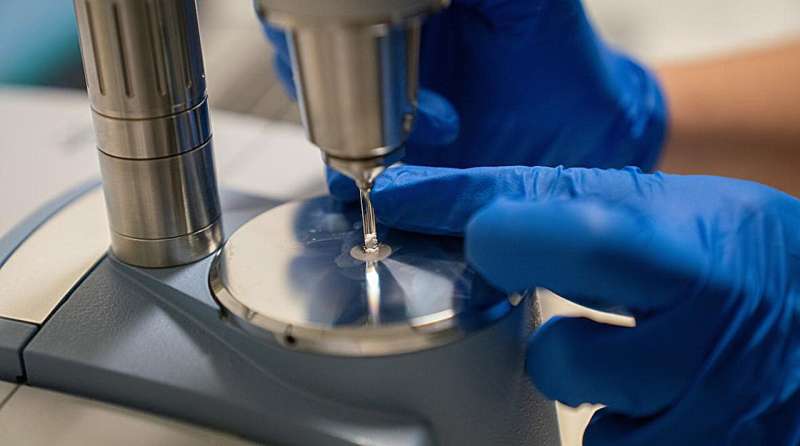This article has been reviewed according to Science X's editorial process and policies. Editors have highlighted the following attributes while ensuring the content's credibility:
fact-checked
peer-reviewed publication
trusted source
proofread
Chemists discover three new recreational drugs that have not previously been reported in Australia

Three new recreational drugs that have never been reported in Australia before have been identified by chemists at Australia's only fixed-site drug checking service, CanTEST, located in Canberra.
According to scientists and clinicians from The Australian National University (ANU), the drugs could have effects similar to other stimulant-like substances such as MDMA, also known as ecstasy, and ketamine, a drug used as an anesthetic for medical purposes. The discoveries were made by Professor Malcolm McLeod and a team of ANU chemists.
It's not yet known how dangerous these substances are or what short- and long-term health impacts they have on the user. The ANU researchers' work analyzing the three new substances is published in the journal Drug Testing and Analysis.
Professor McLeod said one substance submitted for testing, which the client believed to be a derivative of Ritalin, a stimulant used to treat ADHD, was actually a new variant of cathinone or "bath salts"—a dangerous family of chemicals that in some cases have proven lethal.
"Although there are a range of cathinone variants circulating in the community, finding a new one is obviously of concern because we don't know how it will affect people or what the health consequences are," Professor McLeod, who is also Chemistry Lead at CanTEST and Pill Testing Australia, said.
"The second substance we analyzed, which the client believed to be a ketamine-like substance, was in fact a new type of benzylpiperazine (BZP) stimulant, often used as a substitute for MDMA. While derivatives of these stimulants first emerged in New Zealand in the early 2000s, we actually don't know a lot about them.
"As for the third one, the client reported some uncertainty about the identity of the substance. They thought it was a cathinone drug, a stimulant that can have similar effects to amphetamines, but wanted to have it tested to avoid any nasty surprises.
"We later identified the drug to be a new phenethylamine drug known as propylphenidine. Phenethylamines are a category of stimulant drugs that includes amphetamine, methamphetamine and MDMA."
The on-site analysis of all three substances at CanTEST ruled out the expected substances but proved inconclusive. Further laboratory testing at the ANU Research School of Chemistry helped scientists identify the true nature of the drugs.
"After making the discoveries, CanTEST workers were able to immediately notify the community to let people know about these new substances and their potential risks," Dr. David Caldicott, who is also Clinical lead for CanTEST and Pill Testing Australia, said.
"These findings demonstrate an understated ability of services like CanTEST to inform and advise individuals about their choices.
"It turns out that drug checking services can not only change the behaviors of consumers, but when done rigorously, can also identify totally novel drugs as they emerge, and possibly even before they get a hold on local markets.
"This is potentially of huge public health importance, not just to Canberra, but to the rest of the world, and has probably not been fully appreciated to date."
It's not the first time CanTEST has detected new substances circulating in the community. In October 2022, chemists discovered a mysterious new recreational drug that shared similar qualities to ketamine but had a unique chemical make-up. The drug had not been seen in Australia before.
CanTEST has analyzed more than 1,700 samples since opening in July 2022. In late 2022, chemists made a potentially life-saving discovery after detecting a highly dangerous opioid in pills that were falsely sold as oxycodone, triggering a public health alert.
"We know drug checking services like CanTEST help change drug behaviors and reduce harms for users. It's time other states and territories follow the ACT's lead and roll out similar services across the country," Dr. Caldicott, who is also an emergency doctor at North Canberra Hospital, said.
An ANU-led evaluation of the first six months of CanTEST found 1 in 10 samples submitted for testing were discarded once the client learnt what was in them. It also found more than half of the drugs tested at the clinic were not what the user expected.
More information: Jess L. Algar et al, Identification of three unexpected new psychoactive substances at an Australian drug checking service, Drug Testing and Analysis (2024). DOI: 10.1002/dta.3637




















